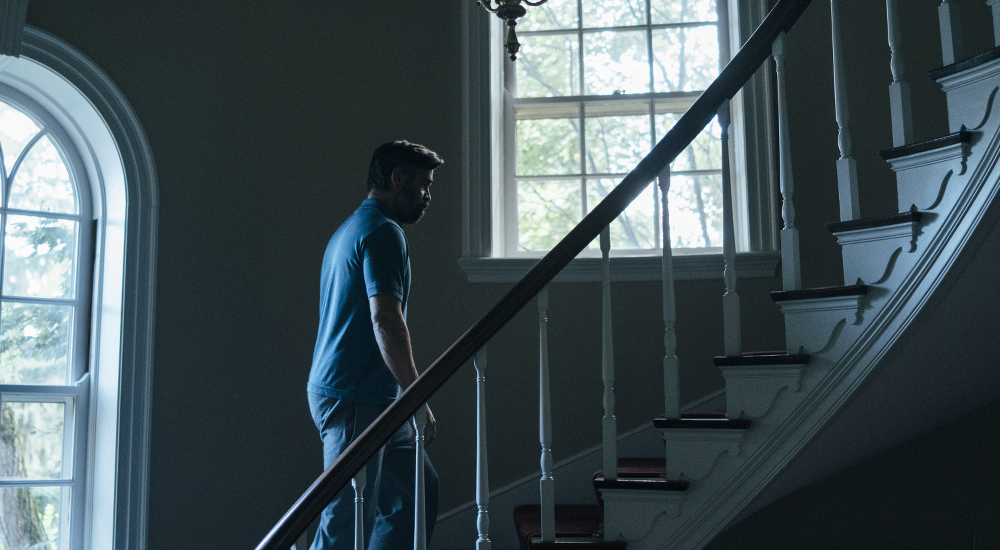“I can’t get up.”
Opening with an overhead view of a throbbing heart, backed by a choral choir, Yorgos Lanthimos’s The Killing of a Sacred Deer fully embodies its psychological thriller classification, offering up a deliberate and methodical slow burn that will send shivers down your spine as you await the next move.
Colin Farrell stars as Steven Murphy, a surgeon with a caring heart who enjoys the comfort of a routine. We pick up well into Steven’s unusual “mentorship” with Martin (Barry Keoghan), a troubled teenager who is in desperate need of a father figure.
Slow and lethargic, Lanthimos works to set up his narrative, utilizing his characters to create an unusual tone that has your nerves on high alert. Every word, big or small, is deliberate and purposeful as everyone over explains their every action, as well as the thought process behind that action. The approach is comical at first, though it quickly migrates into intended stiffness as you find yourself overwhelmed by how little - and how much- is being said.
Steven’s life, both at the hospital and at home. is well calculated. His conversations with his wife, Anna (Nicole Kidman), and their two children bear little personality as the family of four sits around the dinner table methodically going through the day’s events. Though nothing of importance is ever said their approach to each other, the cold and monotone exchanges, allows for a full understanding regarding the family’s emotionless connections. When Anna pretends to have general anesthesia to entice her husband to have sex, you can’t help but realize that the Murphy’s possess love, but struggle to show it.
When Steven decides to introduce Martin to his family, it is done passively, almost hiding the story’s soft tone shift. An awkward conversation involving puberty leads to a haunting acapella performance of Elle Golding’s “Burn” by Steven’s daughter Kim (Raffey Cassidy), which in and of itself is eerie given Lanthimos’ clever camera work.
The following day Martin looks to return the favor by inviting Steven over for dinner at his house, an invitation that is meant to make Steven’s father figure role bear a more “legal” title. But when Martin’s mother (Alicia Silverstone) makes a pass at our happily married protagonist, things don’t end well, setting the stage for a quiet, chilling second act..
It is here that you begin to feel the story taking shape. Lanthimos brilliantly navigates his characters, having them preform subtle and uncanny actions in a genuine way, making you cautiously question the motive behind it all. Is there any importance to Martin’s gift? What about Ben’s long overdue haircut? So much is happening in regard to the details, prompting you to anxiously shift in your seat, fully realizing just how much you had overlooked.
As Steven begins to grow tired of Martin’s presence, slowly shutting him out through a cancelled lunch and a rejected dinner, things become more tense. As you begin to feel the frustration, Steven’s errors begin to mount - noticeably unfortunate for a man who has so decisively planned his every action. Steven’s son Ben (Sunny Suljic) proves to be the first lamb as he wakes one morning unable to move his legs. A trip to the hospital offers up no answers, though a quick lunch date with Martin blows everything wide open.
It doesn’t take long for both kids to find themselves in a hospital bed, taking on fluids as their appetite has suddenly left them. Confused and out of ideas, Anna begins to research Martin to better understand Steven’s connection to the troubled teen. Her discovery allows for more of the film to take shape as we grow to understand the overall look of the massive puzzle Lanthimos has carefully created.
The final few scenes are both mentally disturbing and draining - but within the context of the story itself, they don’t appear forced. It’s a natural progression within the narrative, much like everything before it, that merits the shock and awe conclusion. The Killing of a Sacred Deer is the true definition of chilling craftsmanship. Without doing too much, Lanthimos give us a remarkably ordinary family to watch self destruct through the weight of guilt that eventually personifies itself into a mass of sinister consequences.

